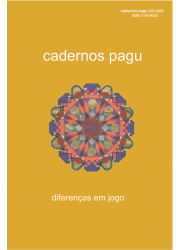Resumo
Este artigo analisa o dilema entre as posturas defensoras do universalismo e das diferenças, tendo como pressuposto que ambas podem resultar no reforço de essencialisarmos excludentes em cenários sociais de desigualdade. A hipótese que foi perseguida é a de que mesmo tomando como primado a necessidade da construção de uma “igualdade mínima essencial” isso só pode ocorrer tomando em consideração os princípios e as lutas que se organizam em torno do direito à diferença. Este paper tratará basicamente com a questão brasileira. A discussão que será levada a efeito aqui tem como base dois textos fundamentais: o relatório da comissão de alto nível que recomendou ao governo francês a proibição do uso véu pelas jovens mulçumanas nas escolas públicas francesas e o último livro de Seyla Benhabib – The Claim of Culture.
Abstract
This article analyses the dilemma between the positions that has defended the universalism and those that has defended the differences, having as presupposition that both can result in the strong ness of exclude essentialism in scenario of social inequalities. The hypothesis that has pursued is as the follow: taking as presupposition the necessity of the construction of a “minimal essential equality” this only can take places taken into consideration the principle and the struggles that organize themselves around the right to the difference. This paper will discuss mainly the Brazilian question. The discussion that will be done in this paper has as bases two fundamentals texts: the Report of the High Commission that has recommended to the French government the prohibition of the use of the scarf by the young Muslim women in the French public school and the last book that was written by Seyla Benhabib – The Claim of Culture.
Key Words: Universalis. Difference. Women. Religion. Public Sphere

